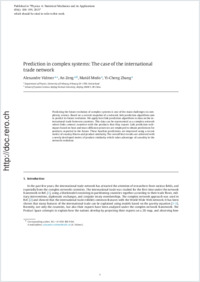Prediction in complex systems: the case of the international trade network
- Vidmer, Alexandre Department of Physics, University of Fribourg, Switzerland
- Zeng, An Department of Physics, University of Fribourg, Switzerland - School of Systems Science, Beijing Normal University, Beijing, China
- Medo, Matúš Department of Physics, University of Fribourg, Switzerland
- Zhang, Yi-Cheng Department of Physics, University of Fribourg, Switzerland
-
15.10.2015
Published in:
- Physica A: Statistical Mechanics and its Applications. - 2015, vol. 436, p. 188–199
English
Predicting the future evolution of complex systems is one of the main challenges in complexity science. Based on a current snapshot of a network, link prediction algorithms aim to predict its future evolution. We apply here link prediction algorithms to data on the international trade between countries. This data can be represented as a complex network where links connect countries with the products that they export. Link prediction techniques based on heat and mass diffusion processes are employed to obtain predictions for products exported in the future. These baseline predictions are improved using a recent metric of country fitness and product similarity. The overall best results are achieved with a newly developed metric of product similarity which takes advantage of causality in the network evolution.
- Faculty
- Faculté des sciences et de médecine
- Department
- Département de Physique
- Language
-
- English
- Classification
- Physics
- License
- License undefined
- Identifiers
-
- RERO DOC 257368
- DOI 10.1016/j.physa.2015.05.057
- Persistent URL
- https://folia.unifr.ch/unifr/documents/304552
Statistics
Document views: 75
File downloads:
- zha_pcs.pdf: 242
